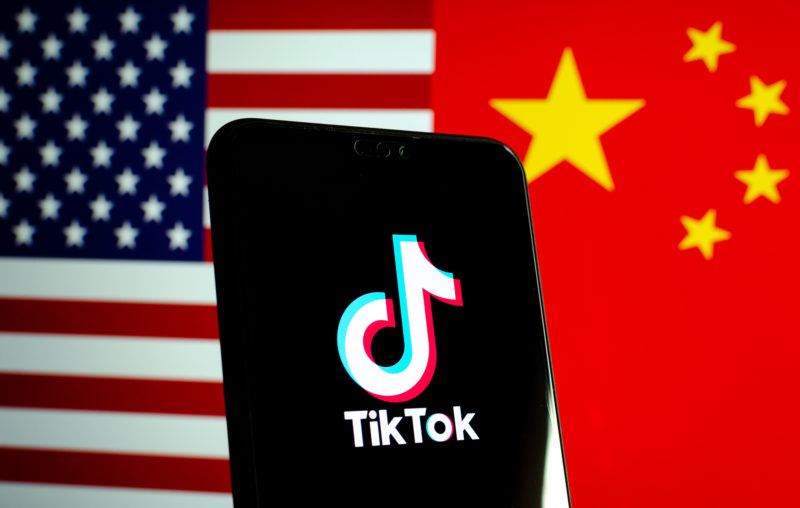The Mugging Of TikTok Should Embarrass Every Sentient American

It’s accepted wisdom that at least in terms of talent, Patrick Mahomes is the greatest quarterback in the world right now. Imagine then, the embarrassment Kansas City Chiefs fans would feel if they witnessed Mahomes belittling Las Vegas Raider third stringer Nathan Peterman about his career stats of 3 touchdown passes and 12 interceptions.
In a musical sense, imagine Beyonce Knowles viciously criticizing the singing of a young, aspiring singer merely thrilled to be showcasing her skills in front of the globally popular diva. More locally, imagine witnessing the richest kid at school teasing the poorest kid for his dated clothes and shoes.
This came to mind while reading about President Trump’s threat last week to ban the globally popular Chinese-owned video app, TikTok. The feeling was shame. It was embarrassment. Americans don’t do this, do they? Americans cheer entrepreneurial initiative, and crucial about this is that they’re in the position to cheer it. The United States is the center of remarkable technological progress, so as Americans we can thrill at others trying to do what Americans are the best in the world at doing. How does one put it other than that Americans have the means to be gracious. At the top of the hill, they can cheer others trying to be like them. In Mahomes and Knowles terms, neither needs to belittle the proverbial Peterman or young singer with stars in her eyes. Why would either? They’re stars.
Yet all-too-many Americans cheered President Trump’s threat of a TikTok ban. How very embarrassing.
All this time we’ve heard from angry Americans led around by fast-typing pundits that the Chinese don’t make anything. Thoroughly controlled by a communist government that suffocates creativity, the alleged contribution to global economic betterment from the Chinese was said to be substandard, unsafe products; those products said by the pundit class to be copies of American products on account of a need seemingly unique within the Chinese to steal.
How did we get here?
Back in the 1970s and 1980s China was so poor that a failure to finish one’s meal in the U.S. was frequently met with “they’re starving in China.” Americans were concerned about our communist Chinese enemies when they truly practiced murderous communism, at which point one would think Americans would be thrilled that the Chinese had shed their impoverished, murderous past in pursuit of capitalist plenty.
But having done that, having become an essential part of global economic progress, having become a huge market for the U.S.’s greatest companies, the response from all-too-many Americans and way too many pundits has been that the Chinese got to where they are by stealing ideas from us. Which is presumably why pundits are pundits, and not actually in the arena of commerce. Think about it.
Not only is imitation of greatness incredibly challenging, it cannot be stressed enough that what is great today is rarely predictive of what will be great tomorrow. If anyone doubts this, revisit newspapers from 2006 when MySpace was thought to be the unbeatable social media monopoly, or 2007 when wise minds laughed off the iPhone’s threat to the globally powerful Blackberry, or how about how Blockbuster shunned Netflix twice when the latter asked the video rental powerhouse to buy it.
So the Chinese steal our best ideas? Ok, which ones? It’s hard to know what’s best. Implicit in the notion that their success has been a function of theft is that the Chinese were remarkably prescient in the way that admitted copycats like Ford, Edison, Gates and Jobs were; as in they knew what to copy. Alas, Gates has long acknowledged that most everything he tried at Microsoft failed….Jeff Bezos has said much the same. Does anyone remember how Jobs rolled out the Lisa? Look it up, after which maybe rethink your certainty that China’s success has been a function of thievery or imitation. You’re wearing your ignorance on your sleeve. Even the ideas that do succeed rarely stay on top for long. Does anyone remember when AOL was the most powerful name in commerce?
Of course with TikTok, this app wasn’t a copycat. It represented an all new approach to social media; one that rapidly took the world by storm. As opposed to imitating, the Chinese innovated, only for Americans previously troubled by their “theft” to call for an outright ban of what they’d created. The Chinese did exactly as Americans had obnoxiously told them to do, “make your own things,” only for them to have their own creation taken by the authoritarian mercantilist who populates the White House.
But wait, it’s not so simple say the defenders of the indefensible. You see, TikTok harvests “unnecessary levels of information” from its users, said one pundit about the company’s theft. It was comical to contemplate. How could this pundit have even a faint clue about what TikTok gathers? Furthermore, who would care? No one was forced to add the TikTok app to their phones, but oh-so-many did because they fell in love with the content on it.
After that, for as long as businesses have existed they’ve been trying to learn as much as possible about their customers and users. That’s the point. Learn about them to improve the user experience. To see what life was like when businesses did not care about customer and user needs, readers need only read about what life was like in the old Soviet Union, and yes, the China that was actually communist.
But wait, said one U.S. editorial, the app that it described “as popular with American children” had raised concerns within the U.S. foreign policy establishment about the “collection of data on U.S. users” (you know, the children watching dance videos….!) given “China’s averred policy of ‘civil-military fusion.’” Were they serious? Even if TikTok were uniquely gathering data for the CCP, as in even if TikTok were making a potentially business-wrecking economic decision, such a policy of data collection from an app “popular with American children” would be manna from heaven for U.S. technology companies only too eager to fill in where TikTok erred. Assuming it erred at all, which is doubtful. Again, the great companies make a point of learning as much as they can about their users. This same editorial concluded in puzzling fashion that the mugging of TikTok that’s still taking place “may be an example of the market increasing business competition and solving a political problem at the same time.” Oh dear. The definition of “market” has really evolved of late. Adam Smith might disagree, and “might” is just yours truly being polite.
Rather than accept what they know to be true about American companies, politicians, pundits and their followers assumed an app “popular with American children” was actually a front for communist expansion. It’s embarrassing to even write. Furthermore, it makes no sense. Not only would sinister use of data lead to TikTok being replaced, why would “China” feel the need to wreck a nation in the process of doing that on its own given its hysterical, and yes, command-and-control response to a virus? Assuming spying on young people and their dance moves might lead to useful information about the political establishment, can we ask what any sane person would care to learn about the thoughts inside the heads of people like Nancy Pelosi, Donald Trump, Joe Biden and Mitch McConnell?
Oh well, it’s really immaterial at this point. A Chinese company innovated, met the needs of people around the world, and President Trump responded by threatening a ban of the company before brokering a potential forced sale of the company to an American company. And it’s the Chinese who are the “communists.” That Trump wants an investment banking fee just adds to the Twilight Zone we’re living in. How thoroughly embarrassing. The whole world is watching, Americans. We deserve neither TikTok nor the very Chinese people who, if we’re honest, are trying to be like Americans used to be.
Republished from Forbes










